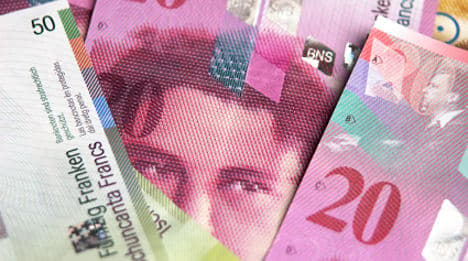Swiss money really is dirty: UK scientists

Swiss money is dirty and no amount of money laundering will change that, scientists say.
In fact, a study by researchers at Oxford University concludes that legal tender in Switzerland is among the dirtiest in Europe, second only to the paper money used in Denmark and Sweden.
The study shows that European banknotes carry an average of 26,000 bacteria.
By comparison, Swiss banknotes — with denominations ranging from 10 to 1,000 francs — contain 32,400 bacteria, according to the findings.
Only the Danish krone and Swedish krona are dirtier with 40,266 bacteria and 39,600 counted respectively.
This is more than just an academic calculation.
Ian Thompson, professor of engineering science at Oxford, says in a release that 26,000 bacteria is more than enough to pass on an infection.
Previous studies have shown that bank notes can be contaminated with harmful bacteria that can cause respiratory, urinary, and wound infections and other diseases.
The Oxford study looked at the currency used in 15 countries and found that the euro is the cleanest of them all, with just 11,066 bacteria.
Thompson has called for wider research into the spread of bacteria resistant to antibiotics through the global movement of money.
The Swiss National Bank, responsible for producing Switzerland’s money, is planning to introduce new banknotes in 2015 after several delays due to technical problems with paper.
It is not clear whether the new notes will be equally bacteria-prone.
The Oxford study confirmed what many people fear about “filthy lucre”.
A study by MasterCard found that 57 percent of respondents across Europe found that banknotes and coins are the least hygienic items they come into contact with on a daily basis.
The credit card company is promoting plastic as a cleaner alternative.
Comments
See Also
In fact, a study by researchers at Oxford University concludes that legal tender in Switzerland is among the dirtiest in Europe, second only to the paper money used in Denmark and Sweden.
The study shows that European banknotes carry an average of 26,000 bacteria.
By comparison, Swiss banknotes — with denominations ranging from 10 to 1,000 francs — contain 32,400 bacteria, according to the findings.
Only the Danish krone and Swedish krona are dirtier with 40,266 bacteria and 39,600 counted respectively.
This is more than just an academic calculation.
Ian Thompson, professor of engineering science at Oxford, says in a release that 26,000 bacteria is more than enough to pass on an infection.
Previous studies have shown that bank notes can be contaminated with harmful bacteria that can cause respiratory, urinary, and wound infections and other diseases.
The Oxford study looked at the currency used in 15 countries and found that the euro is the cleanest of them all, with just 11,066 bacteria.
Thompson has called for wider research into the spread of bacteria resistant to antibiotics through the global movement of money.
The Swiss National Bank, responsible for producing Switzerland’s money, is planning to introduce new banknotes in 2015 after several delays due to technical problems with paper.
It is not clear whether the new notes will be equally bacteria-prone.
The Oxford study confirmed what many people fear about “filthy lucre”.
A study by MasterCard found that 57 percent of respondents across Europe found that banknotes and coins are the least hygienic items they come into contact with on a daily basis.
The credit card company is promoting plastic as a cleaner alternative.
Join the conversation in our comments section below. Share your own views and experience and if you have a question or suggestion for our journalists then email us at [email protected].
Please keep comments civil, constructive and on topic – and make sure to read our terms of use before getting involved.
Please log in here to leave a comment.